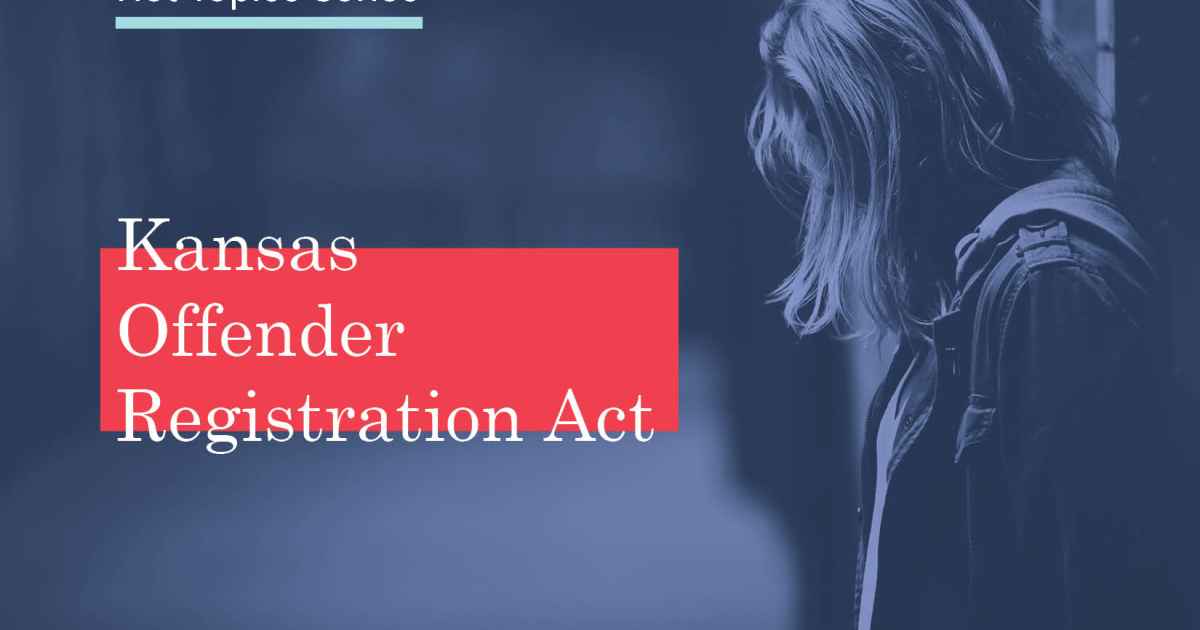Kansas Offender Registry: A Comprehensive Guide To Understanding And Navigating The System
When it comes to public safety, the Kansas offender registry plays a crucial role in keeping communities informed and protected. This system is more than just a database; it’s a tool that empowers citizens to make informed decisions about their surroundings. Whether you’re a parent, a landlord, or simply someone who values transparency, understanding how this registry works is essential.
Now, let’s be real—when we talk about offender registries, it can feel overwhelming. There’s so much information out there, and sometimes it feels like you’re navigating a maze. But don’t worry, we’re here to break it down for you. This guide isn’t just about throwing facts at you; it’s about equipping you with the knowledge to stay safe and aware.
So, buckle up because we’re diving deep into the world of the Kansas offender registry. We’ll cover everything from how it works to why it matters, and even throw in some tips on how to use it effectively. Let’s make sure you’re not just reading but truly understanding what this system means for you and your community.
Read also:Abc Whistleblower Debate Unpacking The Controversy And Its Implications
What is the Kansas Offender Registry?
Let’s start with the basics. The Kansas offender registry is essentially a public database that tracks individuals who have been convicted of certain offenses, particularly those related to sex crimes. It’s like a digital map that helps people identify potential risks in their neighborhoods. But here’s the thing—it’s not just about listing names; it’s about transparency and accountability.
This registry isn’t random. It follows strict guidelines set by both state and federal laws, ensuring that only relevant information is shared with the public. Think of it as a safety net that allows communities to stay vigilant without crossing any legal boundaries.
And before you think it’s all doom and gloom, remember that the registry is designed to help, not scare. It’s about empowering people with information so they can make smarter choices. So, whether you’re checking out a new neighborhood or vetting potential tenants, this tool is invaluable.
How Does the Kansas Offender Registry Work?
Alright, let’s get into the nitty-gritty. The Kansas offender registry operates under the Sex Offender Registration Act, which mandates that certain offenders register their information with local authorities. But how does it all come together?
Here’s the deal: when someone is convicted of a qualifying offense, they are required to register with the Kansas Bureau of Investigation (KBI). This includes providing personal details like name, address, and even employment information. The KBI then updates the public database, making sure everything is accurate and up-to-date.
But here’s the kicker—the level of supervision depends on the severity of the offense. Some offenders might have to update their info every 90 days, while others only need to do it annually. It’s all about tailoring the system to fit the risk level.
Read also:Check Vanilla Card A Comprehensive Guide To Understanding And Using Vanilla Gift Cards
Why is the Kansas Offender Registry Important?
Let’s talk about why this registry matters. In a world where information is power, the Kansas offender registry gives people the tools they need to stay safe. It’s not just about tracking offenders; it’s about fostering a sense of security within communities.
For parents, it’s a way to ensure their kids are playing in safe environments. For landlords, it’s a resource to vet potential tenants. And for everyone else, it’s a reminder that knowledge is key when it comes to personal safety. The registry doesn’t just sit there—it actively contributes to a safer society.
But let’s not forget the bigger picture. By holding offenders accountable and keeping the public informed, the registry helps reduce recidivism rates. It’s a win-win situation where transparency leads to trust and trust leads to safety.
Who is Listed on the Kansas Offender Registry?
Now, you might be wondering who exactly ends up on the Kansas offender registry. Well, it’s not as broad as you might think. The registry primarily focuses on individuals convicted of sex-related offenses, but there are other criteria as well.
- Those convicted of sex crimes against minors
- Offenders who have committed violent sexual acts
- Individuals with repeat offenses
It’s important to note that not every criminal conviction lands someone on the registry. The system is designed to target specific offenses that pose a significant risk to public safety. This ensures that the database remains relevant and effective.
How to Access the Kansas Offender Registry
So, how do you access this information? It’s simpler than you think. The Kansas Bureau of Investigation maintains an online portal where anyone can search for registered offenders in their area. All you need is an internet connection and a few minutes of your time.
Here’s how you can do it:
- Visit the official KBI website
- Enter your zip code or a specific address
- Browse through the list of offenders in your vicinity
And don’t worry—it’s all anonymous. No one will know you’re checking the registry unless you tell them. It’s a private way to stay informed without any hassle.
Tips for Using the Kansas Offender Registry
While the registry is a powerful tool, there are a few tips to keep in mind when using it:
- Don’t jump to conclusions based on what you find
- Use the information responsibly and ethically
- Remember that rehabilitation is possible, and not all offenders pose an immediate threat
It’s easy to get caught up in the numbers and names, but it’s important to approach the registry with a balanced perspective. It’s a resource, not a judgment call.
Common Misconceptions About the Kansas Offender Registry
There are a lot of myths floating around about the Kansas offender registry, and it’s time to set the record straight. Let’s tackle some of the most common misconceptions:
Misconception #1: The registry is only for sex offenders. While it primarily focuses on sex-related crimes, other offenses can also lead to registration, depending on the circumstances.
Misconception #2: Once on the registry, you’re there for life. Not necessarily true. Some offenders can petition for removal after a certain period, provided they meet specific criteria.
Misconception #3: The registry is all about punishment. On the contrary, it’s about prevention and education. It’s a proactive approach to community safety.
Legal Implications of the Kansas Offender Registry
Before we move on, let’s touch on the legal side of things. The Kansas offender registry operates under strict legal guidelines, ensuring that the system is both fair and effective. But what does this mean for offenders and the public?
For offenders, registration comes with certain restrictions. They must comply with reporting requirements and face penalties if they fail to do so. For the public, the registry provides a legal framework for staying informed without infringing on anyone’s rights.
It’s a delicate balance, but one that’s necessary to maintain public trust and safety.
Impact of the Kansas Offender Registry on Communities
Now, let’s zoom out and look at the bigger picture. How does the Kansas offender registry impact communities? The short answer is—it’s a game-changer. By providing transparent access to critical information, the registry helps foster safer neighborhoods.
But here’s the thing—it’s not just about the registry itself. It’s about how communities use it. When people are informed and engaged, they’re better equipped to handle potential risks. This leads to stronger, more resilient communities.
And let’s not forget the ripple effect. When one neighborhood benefits from the registry, the surrounding areas also see improvements. It’s a domino effect that contributes to overall public safety.
Challenges and Criticisms of the Kansas Offender Registry
No system is perfect, and the Kansas offender registry is no exception. Critics argue that the registry can stigmatize individuals and hinder their rehabilitation. While this is a valid concern, it’s important to weigh the benefits against the drawbacks.
Here’s the deal: the registry isn’t meant to punish—it’s meant to inform. It’s a tool that, when used responsibly, can make a positive impact. But like any tool, it requires careful handling and understanding.
Future Developments in the Kansas Offender Registry
So, what’s next for the Kansas offender registry? With advancements in technology, the system is likely to evolve in exciting ways. Imagine a future where the registry integrates with GPS technology, providing real-time updates on offender locations. Or a system that uses AI to predict potential risks before they become issues.
But here’s the catch—these developments must be balanced with privacy concerns. As technology advances, it’s crucial to ensure that the registry remains a tool for good, not a source of fear or misuse.
Looking ahead, the focus will be on enhancing accuracy, accessibility, and accountability. It’s about building a system that works for everyone—offenders, communities, and law enforcement alike.
Conclusion: Stay Informed, Stay Safe
And there you have it—a comprehensive guide to the Kansas offender registry. From understanding how it works to navigating its challenges, we’ve covered everything you need to know. But remember, knowledge is only half the battle. It’s what you do with that knowledge that truly matters.
So, take a moment to explore the registry, educate yourself, and share this information with others. Together, we can create safer, more informed communities. And who knows? You might just inspire someone else to do the same.
Now, it’s your turn. Leave a comment, share this article, or dive deeper into the resources available. The more we talk about it, the better equipped we’ll be to face the challenges ahead. Stay safe out there!
Table of Contents
- What is the Kansas Offender Registry?
- How Does the Kansas Offender Registry Work?
- Why is the Kansas Offender Registry Important?
- Who is Listed on the Kansas Offender Registry?
- How to Access the Kansas Offender Registry
- Common Misconceptions About the Kansas Offender Registry
- Legal Implications of the Kansas Offender Registry
- Impact of the Kansas Offender Registry on Communities
- Challenges and Criticisms of the Kansas Offender Registry
- Future Developments in the Kansas Offender Registry


